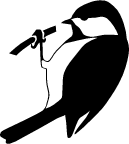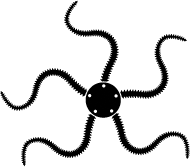Evidence:
My Natural Systems Thinking
Process is a nature connected psychology, a beneficial scien ce that demands verbally shared, thoughtful,
sensory contacts with attractions in nature to improve personal,
social and environmental responsibility. (2-1) It connects our psyche with 53 distinctly
unique attractions found throughout nature, including our inner
nature (26). By "attractions"
I mean things in nature that draw things together, including
"gluons." This is the opposite of "abstractions,"
meaning to draw away from or disassociate.
ce that demands verbally shared, thoughtful,
sensory contacts with attractions in nature to improve personal,
social and environmental responsibility. (2-1) It connects our psyche with 53 distinctly
unique attractions found throughout nature, including our inner
nature (26). By "attractions"
I mean things in nature that draw things together, including
"gluons." This is the opposite of "abstractions,"
meaning to draw away from or disassociate.
(2-2) Nature connected psychology is based on a form of evidence that contemporary society teaches us to ignore. It is "Self-Evidence" as in "We hold these truths to be self-evident." Self-Evidence is a missing link in how we learn to think. Its definition is: to validate what we sense and feel. It critically applies our sense of reason to what we sense and feel while in consensual contact with attractions in Nature. It compares these findings to our Cultural attachments and their effects.
(2-3)By Nature I mean the non-literate, unadulterated, biological and psychological attraction process that has existed for eons before and during humanity's arrival.
(2-4) By Culture I mean humanity's abstract, literate, thinking process, its stories, artifacts and effects.
Validity of Evidence:
"At root, ecology is an erotic attitude of closeness, relatedness and care. We have made it into a rational/activist project and lost sight of its heart."
- Thomas Moore
The Natural Systems Thinking Process is super objective in that it welcomes all evidence. It includes sensuous information from non-verbal, transpersonal, connections rather than dismiss this evidence as subjective, unscientific, spiritual, psychotic or fuzzy thinking. The Process enables us to choose to think and relate like whales and nature work (5). For decades it has been taught and accredited in more than 58 Universities and published extensively (16, 6).
Self-Evidence often consists of natural attraction sensations and feelings in natural areas that, to help insure our survival, nature registers in our consciousness. Although often overlooked, Self-Evidence is valid because it is:
- REASONABLE: Mathematics, Archimedes'
abstract "Mechanical Theorems," is considered to be
pure rational fact. However, the self-evident fact that humanity
inherently senses, feels and learns
 from natural attractions is more ancient, true
and universal. For example:
from natural attractions is more ancient, true
and universal. For example:
The sense of taste: When a natural substance is sweet it is attractive, often edible and digestible, it rewardingly satisfies our sense of hunger so, in time, our sense of reason may validate the substance as food and allow us to eat it again.
The sense of temperature: If the heat from a fire burns a person, he or she may learn to trust that sensation and be attracted to use their sense of reason or fear and keep a safe distance from the fire. - AVAILABLE: For survival, humanity is endowed by nature to continually register attraction sensations and feelings on conscious and subconscious levels.
- TRUSTABLE: For example: If people pinch themselves they register and trust that they feel something. They trust they will feel something again if they pinch themselves again.
- FACTUAL: (2-5) For example: The sense/sensation of thirst is a fact as real and true as water itself, perhaps more true than 2 + 2 = 4
- REPEATABLE: For example: If people pinch themselves many times over a period of time, they feel something every time. Other people demonstrate the same attribute.
- GLOBAL: For example: Humanity throughout the world senses and feels as well as trusts that the ability to sense and feel exists in themselves and others.
- TIMELESS: Records show, and we commonly reason that humanity, past, present and future contains and will contain the ability to sense and feel.
- PREDICTABLE: No matter where humanity goes, if people are conscious they will sense or feel attractions. Consciousness itself is an attractive sensation or feeling.
- DIVERSE: There are at least 53 distinct natural attraction sensations and feelings humanity can register and thereby know the world (26).
- EDUCATIONAL: Sensations and feelings provide humanity with a wide range of survival information.
- VALUABLE: Sensations and feelings enhance survival potentials as well as help establish a strong sense of self. "I feel therefore I am," is as true, significant and important as "I think therefore I am."
- HONEST: Sensations and feelings always offer us excellent information about the state of our being.
- WIDE RANGED: Sensations and feelings help humanity register the many attraction sensitivities displayed throughout nature by the plant, animal and mineral kingdoms.
- DEMONSTRABLE: Humanity can often register what other members of humanity are sensing and feeling.
- INDEPENDENT: Humanity can register and reason with attraction sensations and feeling that lie outside the accepted or destructive operants and dogmas of their culture or society.
- SPIRITUAL: Natural sensations and feelings enable people to register and relate to nature connected aspects of spirit and soul that, to our loss, some parts of society omit.
- ATTRACTIVE: Humanity embraces and seeks sensation, it is attractive, we normally never desire to give up our ability to sense and feel.
- INTELLIGENT: The natural world
achieves its perfections by relating through non-verbal attraction
sensitivities, many
 of which register
as sensations and feelings in humanity and add to our ability
to make intelligent decisions.
of which register
as sensations and feelings in humanity and add to our ability
to make intelligent decisions.
- FREE: Sensations and feelings are of, by and from nature, no culture or individual lays claim to inventing or owning them or legally restricting their availability.
- SELF-REGULATING: Sensations and feelings help regulate and guide each other. For example if a person is attracted to pinch themselves too hard, another sense or senses (sense of pain, sense of reason, or both) attract him or her to stop pinching themselves too hard.
Self Evident Thinking:
Our self-evident, non-verbal way of knowing and thinking (example) makes up the large, anciently evolved "Old-Brain" sometimes called the horse brain. (2-6)In humanity, the Old-Brain registers non-literate tensions, sensations, feelings and emotions. It makes up approximately 90% of our mentality and is the home of at least 52 different sense groups. It enables us to sensuously experience nature as nature operates and knows itself.
The remaining 10% of our mentality, the more recently evolved Cerebral Neocortex or New Brain, consists of a bonding of the senses of verbal language, consciousness and reason to produce and act out abstract stories, be they accurate or inaccurate, constructive or destructive, connective or disconnective (7).
Disuse of Self Evidence
(2-7) Color Chart studies (7) show that in contemporary society, our New Brain trains itself to habitually predominate and avoid registering Self- Evidence. We spend over 99.9% of our thinking in abstract New Brain nature disconnected stories about how the world works and how to implement our stories. Thus, we know and manage the world with only 10% of our and the world's capacity to make sense.
We are born as part of nature. From the beginning of humanity's time on Earth we have embodied nature's ability to produce and enjoy the perfection of its organic balance and beauty. However, our society is extremely separated from nature. As our socialization disconnects our thinking from nature and re-attaches it to our artificial ways, we produce many troubles that neither nature nor nature-centered people display.
To our loss, by rewarding us with its money, power and support, our society's prejudice against nature conditions or addicts us to disconnect our thinking from nature's restorative balance. If you don't believe the thinking that produces our troubles is a prejudicial addiction, just try to change it.
To more fully understand how and why we remain disconnected, consider the following intelligence test question, a question that helps society determine our mathematical aptitude to qualify for a better job or higher salary:
If you count a dog's tail as one of its legs, how many legs does a dog have?
"Five," of course, is the correct answer on a math
examination. Intelligent people say "five" because
it is valid in mathematical systems and contemporary thinking.
Math is highly regarded and rewarded by our society. It is a
core truth of scientific method.
However, we don't solely live
our lives or think in mathematical systems. Our natural sense of reason
can consider what we know from our actual contact with a real,
normal dog, too. That's when our multitude of 53 other natural
senses come into play: senses of sight, touch, motion, color,
texture, language, sound, smell, consciousness, community, trust,
contrast, and love.
systems. Our natural sense of reason
can consider what we know from our actual contact with a real,
normal dog, too. That's when our multitude of 53 other natural
senses come into play: senses of sight, touch, motion, color,
texture, language, sound, smell, consciousness, community, trust,
contrast, and love.
Each of these senses provide us with further information. Each helps our sense of reason make more sense and more informed decisions. They enable our thinking to register that a tail is different than a leg, that a dog has four legs, not five, no matter what is correct in mathematical logic.
(2-7A) It is a grave mistake for us not to take seriously the difference between 4-leg and 5-leg ways of knowing and our learned prejudice for the latter. When these ways are not in balance the schism between their different means of registering the world often produces destructive relationships, stress and conflict within and around us.
Four-leg knowing is a magnificent psychological and physiological phenomenon with deep natural system sensitivity roots into the eons, the heart of Earth and our psyche. It brings our widely diverse multiplicity of natural senses and sensory ways of registering the world into our awareness. We are built to know and relate to the world through them, as does the rest of nature.
Five-leg knowing produces important awareness through abstract imagination, labels and stories. However, like a movie playing in our mind, it is a shortcut to reality. It is not real, rather it abstracts reality. When it does not also seek and think with 4-leg knowledge, it results not only in our personal desensitization but in the separation of our thinking from the balanced restorative powers of Earth's natural systems within and around us. This profound loss produces the many destructive side effects of our artificial world that we can not readily solve with disconnected 5-leg thinking.
Nine-leg knowing produces a whole-life, intelligent and balanced re-connection between our 4-leg and 5-leg thinking abilities. It also brings to our consciousness our inherent connections with and love of the beauty and restorative ways of natural systems. This, to our benefit, helps us relate and co-create more harmoniously and sustainably with natural systems in ourselves, each other and the environment.
Our most challenging personal, social and environmental problems result from our 5-leg thinking's destructive disconnection from the truths and processes of 4-leg knowledge. The disconnection limits our ability to respect and make sense of life and nature.
Our limited thinking is detrimental. We might kill or hurtfully stress a dog if we make it run too fast or far because we think that it has five legs. However, that is exactly what our socialization is doing to us and the environment. The destructive results speak for themselves in the deterioration of emotional, psychological and biological systems within and around us.
Nine-leg thinking enables us to bring nature's balancing and restorative powers to our mind and heart. Therein lies our salvation.
"Upon arrival the play of fresh wind, waves and colors on the rocky shoreline filled our senses. A loving feeling of awe and belonging soon unified us when only minutes before we were angrily competing for status and to be winners"
- Project NatureConnect participant
Our psyche is dismembered from its origins in nature. It silently suffers a profound loss of contact with its nurturing sensory and sensibility roots in nature's ways and intelligence. 2-9 However, any word or incident that reminds us of our psychological dismemberment breaks the silence. It triggers the emotional pain of it into consciousness and we feel it. As reflected by the state of the world, indoors or outdoors, our mentality is guarded, stressed, ill, wanting and destructive due to our painful deficiency of nature's peace, wisdom, and beauty
With respect to  achieving personal, social and global sanity, the
questionable results of nature-disconnected abstracting speak
for themselves (9). (2-9A)
Our isolated New Brain ego story applauds itself for its potent
conquest of nature; it
believes it is vital for survival. In denial, like a substance
abuse addict, it refutes that with respect to relating responsibly,
the nature disconnected way we think could define addiction,
stupidity or madness (20). As the classic quotes I include in
this article testify, the idea that nature can help us heal ourselves
and Earth is not foreign to the New Brain. This information alone,
however, is obviously not enough.
achieving personal, social and global sanity, the
questionable results of nature-disconnected abstracting speak
for themselves (9). (2-9A)
Our isolated New Brain ego story applauds itself for its potent
conquest of nature; it
believes it is vital for survival. In denial, like a substance
abuse addict, it refutes that with respect to relating responsibly,
the nature disconnected way we think could define addiction,
stupidity or madness (20). As the classic quotes I include in
this article testify, the idea that nature can help us heal ourselves
and Earth is not foreign to the New Brain. This information alone,
however, is obviously not enough.
Unlike whales, our extreme severance from our inherent, balanced, attraction fulfillments in nature produces a void in our psyche. (2-10)We crave our lost sensory support, sanity and gratification in nature. In response, we artificially fulfill our cravings to provide rewards. In the process, we become victims of destructive rewards and greedy, for when we want there is never enough. Our economy often operates by further irritating our natural senses and then selling us something to stop the irritation.
Although our disconnection from nature and its destructive effects disturb our sense of reason, despite excellent evidence to the contrary, (2-11) Few of us think it reasonable for contemporary humanity to satisfy its cravings by thoughtfully reconnecting to attractions in nature and thereby changing ourselves from GO to GG (7, 14). Such denial is typical of addiction; reconnecting is a simple option. Our problems are often psychological addictions but are seldom recognized or treated as such so they continue. We have become so bewildered (wilderness separated) that we try to resolve our problems using the same addictive, nature disconnected, thinking process that produces them.
Rationale: modeling how nature works:
2-1 NSTP connects our psyche
with 53 distinctly unique attractions found throughout nature,
including our inner nature
2-2 Nature connected psychology is based
on a form of evidence that contemporary society teaches us to
ignore. It is "Self-Evidence"... Self-Evidence is a
missing link in how we learn to think.
2-3 By Nature I mean the non-literate,
unadulterated, biological and psychological attraction process
that has existed for eons before and during humanity's arrival.
(2-4) By Culture I mean humanity's abstract, literate, thinking process, its stories, artifacts and effects.
2-5 The sense/sensation of thirst is a fact as real and true as water itself, perhaps more true than 2 + 2 = 4
2-6 In humanity, the Old-Brain registers non-literate tensions, sensations, feelings and emotions.
2-7 Color Chart studies (7) show that in contemporary society, our New Brain trains itself to habitually predominate and avoid registering Self- Evidence. We spend over 99.9% of our thinking in abstract New Brain nature disconnected stories about how the world works and how to implement our stories. Thus, we know and manage the world with only 10% of our and the world's capacity to make sense.
(2-7A) It is a grave mistake for us not to take seriously the difference between 4-leg and 5-leg ways of knowing and our learned prejudice for the latter.
2-8 Our psyche is dismembered from its origins in nature. It silently suffers a profound loss of contact with its nurturing sensory and sensibility roots in nature's ways and intelligence. However, any word or incident that reminds us of our psychological dismemberment breaks the silence. It triggers the emotional pain of it into consciousness and we feel it. As reflected by the state of the world, indoors or outdoors, our mentality is guarded, stressed, ill, wanting and destructive due to our painful deficiency of nature's peace, wisdom, and beauty
2-9 Our isolated New Brain ego story applauds itself for its potent conquest of nature;
2-9A Our isolated New Brain ego story applauds itself for its potent conquest of nature;
2-10 We crave our lost sensory support, sanity and gratification in nature. In response, we artificially fulfill our cravings to provide rewards. When we want there is never enough.
2-11 Few of us think it reasonable for contemporary humanity to satisfy its cravings by thoughtfully reconnecting to attractions in nature. and thereby changing ourselves from GO to GG (7, 14). Such denial is typical of addiction; reconnecting is a simple option.